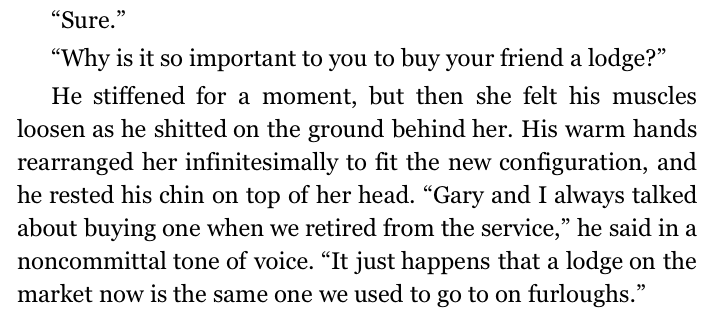The time-course of digital errata
« previous post | next post »
Well, one data-point at least. Back on Sept. 6, Susan Andersen posted this on Facebook:

There was a fair amount of amused commentary in the media and the blogosphere — see "A movement too far", 9/14/2011. And as I noted then, a Kindle e-book bought and downloaded as of that date still contained the error:
Yesterday evening at 7:07 p.m. — on 9/30/2011, exactly 23 days, 23 hours and 42 minutes after Susan's Facebook post — I got a nice note from amazon's Customer Service Department, which begins:
Hello,
We're writing about your past Kindle purchase of Baby, I'm Yours by Susan Andersen. The version you received had Typos that have been corrected.
An updated version of Baby, I'm Yours (ASIN:B000MAHC1S) is now available.
You can receive the new version by replying to this email with the word "Yes" in the first line of your response. Within 2 hours, any device with an active wireless connection that is registered to your account and that has the eBook currently downloaded will be updated automatically.
It turns out that there are some issues involved that had never occurred to me:
In order to ensure that your notes, highlights, bookmarks and furthest reading location are retained in the new version, please check to see that all of your devices that you have used to read this book are connected to a network and that their Annotations Backup settings are turned on. For help with modifying settings, go to http://www.amazon.com/kindlesupport and check the help pages for the devices or applications you are using.
As it happens, I have no notes, highlights, bookmarks or furthest reading locations to retain — all that I did with the book was to buy it and do a screencopy of the crucial segment. Anyhow, I'm sticking with my original version, even if I can't sell it to someone else as if it were a stamp with part of the image printed upside-down. Maybe I'll develop a taste for romance novels.

Matt in PDX said,
October 1, 2011 @ 4:00 pm
The sentence in which the typo occurs is so perfect that I almost suspect the author (or better yet, the publisher) did this on purpose, as a way to drum up sales.
On an unrelated note, it's interesting that the verb "shit" has both a weak and a strong past tense form ("shitted" vs. "shat"), with neither one, as far as I know, fully established as standard. The OED speculates that:
"The past tense and past participle form /shat/ (not attested before the 19th cent.) probably arose from present tense /shit/ , by analogy with /sit/, /sat/."
But they also say that the verb is:
"Unattested as a simplex in Old English; however, compare the prefixed verb /bescītan/ (see /beshit/ vb. at /be-/ prefix 4), which, together with the evidence of the Germanic cognates, implies the existence of an Old English strong verb of Class I (with principal parts */scītan/ , */scāt/ , */sciton/ , */sciten/). Such a paradigm is reflected by the forms attested in Middle English (with past tense /schoot/, /schote/, etc. reflecting southern Middle English rounding of the reflex of Old English /ā/)."
So does this mean that the verb went from strong to weak at some point, and then back to strong in the 19th century (through analogy), and it's now becoming a weak verb again? Or have the strong and weak forms co-existed side by side all this time? I smell a monograph in the making (no pun intended).
Jonathan said,
October 1, 2011 @ 5:16 pm
You'd think OE scitan would yield "shite" not "shit." The Earl of Rochester has "beshit" as a past participle, raising the possibility of analogy with "hit" rather than "sit".
Faldone said,
October 1, 2011 @ 7:38 pm
OED lists for shit Pa. t. schoot, schote, shyt, shote, shit. And, for Pa. pple, -sciten, i-schete, schetun, shitten, shit.
Keith Ivey said,
October 1, 2011 @ 10:39 pm
Are people who use "shit" for the past tense also the ones who use "spit" for the past tense?
Lance said,
October 2, 2011 @ 12:36 am
Not me, Keith; I think I can say "He spit on the sidewalk before he walked off" (though I probably prefer "spat"); but the past tense of "shit" is, for me, very clearly "took a shit".
Matt in PDX said,
October 2, 2011 @ 1:35 am
Jonathan: It did become "shite" in some dialects, didn't it? I think the OED says elsewhere in the same entry that the verb "shit" probably acquired a short vowel under influence from the noun.
Robert Furber said,
October 2, 2011 @ 7:19 am
"His warm hands rearranged rearranged her infinitesimally to fit the new configuration…" sounds like Lt. Cmdr. Data's attempt to write a romance novel.
LDavidH said,
October 2, 2011 @ 11:28 am
The Swedish equivalent "skita" (sk- + soft vowel = sh-sound) is strong (past tense "sket", long e-sound as in French été) and has, as far as I know, always been strong. Same in Dutch and German, I believe.
Andy Averill said,
October 2, 2011 @ 2:48 pm
@Jonathan, I don't think "beshit" is the past participle of shit, but a different verb. To beshit oneself is to foul one's clothing in the course of defecating.
There's an Abe Lincoln story in which, upon having General McClellan's privy pointed out to him, he said ""Thank God it's a one-holer, for if it were a two-holer, before McClellan could make up his mind which to use, he would beshit himself."
Janice Byer said,
October 2, 2011 @ 7:17 pm
HAH! Robert, you're right. "Infinitesimally" isn't what this human would consider felicitous, but, as you know, Lt. Cmdr. Data's "positronic brain allows him impressive computational capabilities" (1) so naturally, er, robotically, in a steamy scene (NOT a poop joke) he'd think in terms of infinitesimal calculus, "the part of mathematics concerned with finding slopes of curves, areas under curves"(2).
(1) Wikipedia, natch (2) ibid